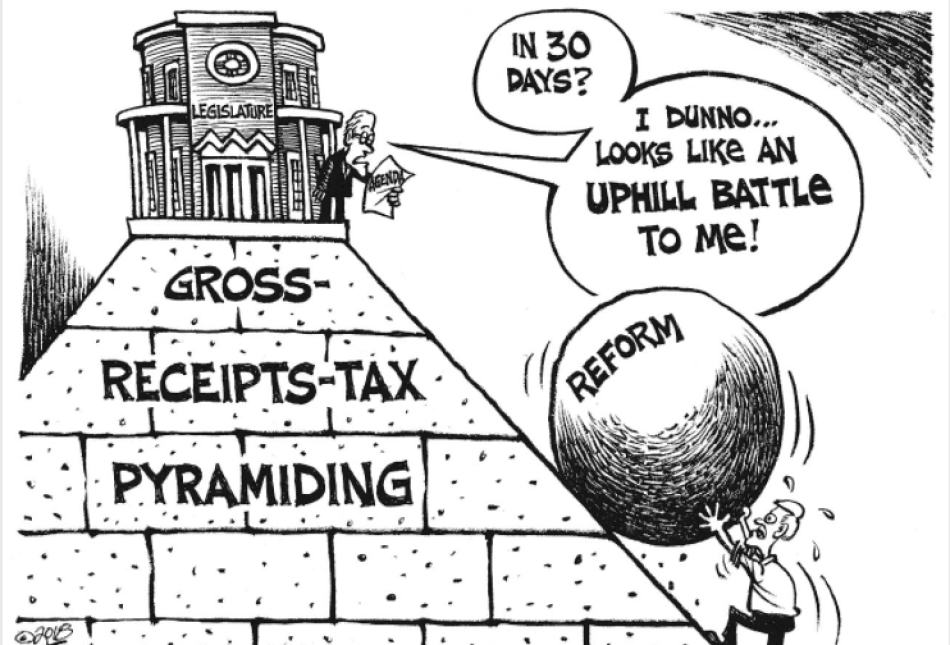Time is Right to Reform New Mexico’s Tax Code

![]()
New Mexico has a golden opportunity right now. The discovery of incredible oil riches in the Southeastern part of our State is not just a once-in-a-generation opportunity. Rather, it is the kind of thing that happens only rarely in the history of any state or nation. It is the kind of opportunity that we simply cannot let slip through our fingers.
Thanks to new discoveries in the Permian Basin New Mexico has seen oil production triple since 2012. It will likely double again by 2021. That is great news and it has boosted New Mexico’s sluggish economy. In May, for the first time since 2013, the State’s job growth exceeded the national average.
That’s very good news, but in spite of this phenomenal growth in the Permian New Mexico has the 2nd-highest unemployment rate in the nation and both job and overall economic growth lag far behind those of our fast-growing neighbors like Texas, Arizona, and Utah.
As was reported recently in the latest “Kids County” report, New Mexico children face the worst overall conditions of any state. The underlying issue is poverty. And, while raising an entire State out of long-standing poverty is not easy a diversified and thriving economy will certainly help.
While the oil revenue is welcome, there are dangers. In their post-session review the LFC noted that 35 percent of the State’s revenues are now directly dependent on the oil and gas industry. That’s up from just 26 percent. It is dangerous to rely so heavily on any one industry but oil prices are notoriously volatile.
It is high time that New Mexico diversify its economy. The oil boom is a valuable tool policymakers can use to achieve that goal.
The shortest path to economic diversification is to finally reform the unfair, anti-business, and regressive gross receipts tax. The Rio Grande Foundation has long argued for reform of the GRT. In 2019 many of the “revenue enhancing” pieces of a prospective revenue-neutral tax reform were adopted (Internet sales taxes and taxes on non-profit hospitals and managers of our National Labs for example).
But with all of these “revenue enhancements” already in place and the State expecting yet another massive oil-funded surplus it is critical for the future of our State that the Legislature and Gov. reform the GRT to benefit New Mexico for decade to come.
This is an issue of bi-partisan concern. The GRT harms entrepreneurs and any small business that doesn’t have the money to hire a lobbyist to get an exemption. And, as a petition up on the liberal website MoveOn.org notes, doctors who accept Medicaid are forced to pay gross receipts taxes on those already-low disbursements under that program. The active petition was put there by a clinical psychologist currently working with Native American youth and families. Certainly if lifting New Mexicans out of poverty is a “progressive” goal it makes no sense to tax the vanishingly few medical providers who are willing to take on large numbers of Medicaid patients.
It is time to lower the GRT rate and eliminate taxes on service providers to small businesses including bookkeepers, accountants, website managers, and numerous other basic business services which are taxed here in New Mexico at rates exceeding 8 percent while those same services are untaxed in most other states.
Outside of oil and gas New Mexico is lacking in terms of the number of startups and fast-growing small businesses. Some of today’s small businesses will grow up to become tomorrow’s corporate community that pumps money back into the local economy while consistently generating jobs and providing a literal foundation for future economic prosperity. For too long New Mexico’s tax structure, thanks to the GRT, has made New Mexico unattractive as a location.
The 2020 legislative session provides a unique opportunity to change that.
Paul Gessing is the President of New Mexico’s Rio Grande Foundation. The Rio Grande Foundation is an independent, non-partisan, tax-exempt research and educational organization dedicated to promoting prosperity for New Mexico based on principles of limited government, economic freedom and individual responsibility
